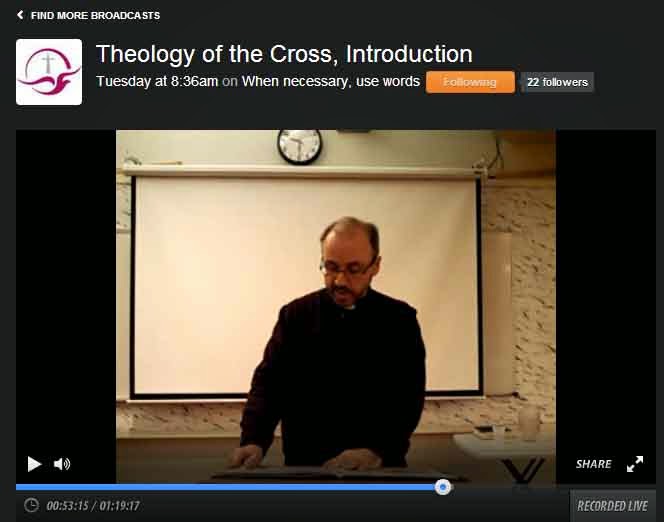If you have not already done so, please watch the video of the talk on Tuesday, March 18 or read the full text of the talk here.
The method of execution known as crucifixion, "invented by the Persians and perfected by the Romans" as an instrument of a tortuous death, was reserved for slaves, foreigners, and all those conquered people who were subjected to the domination of Rome. Roman citizens were exempt from death by crucifixion, even if found guilty of grievous crimes. A slave could be put to death by crucifixion for the slightest of offenses.
Paul tells us that Jesus Christ identified with the slave, for "he emptied himself, taking the form of a slave, coming in human likeness; and found human in appearance, he humbled himself, becoming obedient to death, even death on a cross (Phil 2: 9)" and in doing so, Jesus identifies with the poorest, the most vulnerable among us. The good news that Paul confidently preaches, is the Crucified Christ now Risen, for "because of this, God greatly exalted him and bestowed on him the name that is above every name, that at the name of Jesus every knee should bend, of those in heaven and on earth and under the earth, and every tongue confess that Jesus Christ is Lord (Phil 2: 10-11)." The good news of the Risen Christ, in victory over death, breathes new life, dignity, worth, and meaning into whole groups of people whose lives consisted of endless laborious toil for a ruling class that regarded them as less than human and often treated them worse than work horses.
Paul preaches the good news that in Jesus Christ, "there is neither Jew nor Greek, there is neither slave nor free person, there is not male and female; for you are all one in Christ Jesus (Gal 3:28)" and powerfully brings forward the idea of an encounter with Christ that gives and and restores the fullness of dignity to all classes of people.
Among the Jewish people, sickness, bad fortune, and poverty were still largely viewed as the result of sin. Jesus manifests the image of God as Love and both heals the blind man and transforms how the disabled are viewed, for "his disciples asked him, “Rabbi, who sinned, this man or his parents, that he was born blind?” Jesus answered, “Neither he nor his parents sinned; it is so that the works of God might be made visible through him (John 9:2-3)."
The good news of Christ, crucified and risen, of a God that identifies with the poor, the hurting, the suffering, and the vulnerable, of a God of Love that (as Fr. James describes in Tuesday's talk) "generously and abundantly seeks each heart," spreads quickly, fueled by the Spirit, like wildfire among all classes, reaching all surrounding cities and expanding beyond to other cities, penetrating the Roman military, the courts, the ruling class, and finally the family to the emperor's throne.
The newly converted Christians were convicted by an encounter, a permeating presence of Jesus that completely changed their outlook on life. An encounter with the Risen Christ in varying ways, both explained and unexplained, changed the way they viewed their life, evaluated their life, and how they lived their life. Paul's conversion was profound, but even more profound was a growing community of believers that were also willing to risk their very lives because of faith in Jesus. An idea, an illumination, an encounter had occurred, and this encounter transformed the world.
As Fr. James mentioned in his talk, the paschal mystery, from the Last Supper to Easter, form one single event. "Christ died for our sins; Christ was buried; Christ arose on the third day; Christ appeared to his disciples; and All those who encounter Christ live now in him and hope to live eternal life."
The Triduum, celebrating the paschal mystery of Christ, on Holy Thursday, Good Friday, and Easter is scheduled at St. Francis of Assisi Parish at the following times:
Thursday of the Lord's Supper, April 17
Holy Thursday Mass at 7 p.m.
Good Friday of the Passion of our Lord, April 18
Living Stations begin at 12 noon
Celebration of our Lord's Passion begins at 1:30 p.m.
Evening Prayer begins at 6:30 p.m.
Easter Vigil in the Holy Night, April 19
Vigil on Saturday with Mass at 8:30 p.m.
Easter Sunday of the Resurrection of the Lord, April 20
Sunday Masses at 7 a.m.; 8:30 a.m.; 10:30 a.m.; 12:30 p.m.
